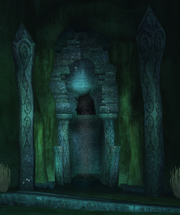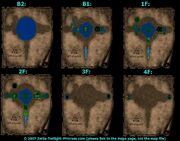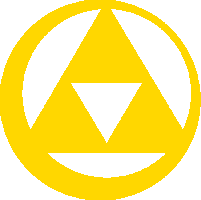(Replacing links with link templates or fixing error in previous edits w/ AWB) |
InvisibleGanon@legacy41971528 (talk | contribs) (→Trivia) |
||
| Line 53: | Line 53: | ||
*The background music in the Lakebed Temple is, in some ways, thematically similar to that of the [[Water Temple]] of {{OOT}}. |
*The background music in the Lakebed Temple is, in some ways, thematically similar to that of the [[Water Temple]] of {{OOT}}. |
||
*It is possible to perform a boss key skip for the Lakebed Temple, as the boss door itself doesn't actually lead directly to the boss chamber (Link must drop down a hole past the door). This is the only case in ''Twilight Princess'' in which this is possible. |
*It is possible to perform a boss key skip for the Lakebed Temple, as the boss door itself doesn't actually lead directly to the boss chamber (Link must drop down a hole past the door). This is the only case in ''Twilight Princess'' in which this is possible. |
||
| + | *At the entrance to the temple, a swimming Zora will recognize Link as a hero and will be very glad in offering you water bombs. The bombs cost the same as at Barnes' bomb shop. |
||
| − | |||
{{ref}} |
{{ref}} |
||
{{Names |
{{Names |
||
Revision as of 00:04, 31 July 2014
Template:Dungeons Lakebed Temple, also known as the Zora Temple,[1] is the third dungeon within Twilight Princess.
Entrance to the Temple

The entrance to the Temple
The dungeon is located at the bottom of Lake Hylia, and as such, it is thought by many to be the very same Water Temple seen in Ocarina of Time. Link can only gain access to it after both acquiring the Zora Armor in Kakariko Village and purchasing some Water Bombs, as the entrance itself is blocked by a boulder.
The temple is based around water and seems to be a spiritual successor to the Water Temple of Template:OOT, but instead of level manipulation, the dungeon's functionality is actually based on the transport of water from its sources to dried rooms, and would hence be more closely linked to the Swamp Palace from Template:ALTTP; notably, several rooms contain large ancient gears and waterwheels, which, albeit not to the same extent as the complex machinery in the Goron Mines, seem to show an advancement in technology since the events of Ocarina of Time.
This temple's greatest feature is its rotating central staircase, which must be manipulated to move the bodies of water in the dungeon. Using different handles and mechanisms, Link must bring the flow of water to move waterwheels and platforms to get deeper into the temple. Link's main goal is to get the water level in the rotating central staircase room high enough to reach the boss door; during the exploration, he also must frequently shoot Bomb Arrows to bring down some rock formations on the ceilings, so that he can climb up to some spots.[2] The item Link receives in this temple is the Clawshot, a highly upgraded version of the Hookshot, needed to reach to otherwise inaccessible places. It is acquired after defeating the mini-boss, the Deku Toad.

The map of the Lakebed Temple.
In terms of structure, the Lakebed Temple resembles the Fire Temple from Template:OOT, having multiple floors (more so than in the original Water Temple) and the highest rooms being parallel to each other, as if the two main sides of the temple (west and east) were intended to have a symmetry. A notable difference, in comparison to the aforementioned Fire Temple, is that Link has to fully explore both sides to clear the dungeon, whereas the Eastern highest-end rooms of the Fire Temple are optional.
The final boss is Morpheel, a giant eel-like creature with eight tentacles and a single eye that can travel freely between them. Upon clearing the dungeon, Link receives the third and final Fused Shadow and another Heart Container.[3] The boss is found after Link descends through a long shaft downwards leading to the battle arena, in a similar way to the boss room of the Great Bay Temple in Majora's Mask, although the Lakebed Temple has to be swam down to, while Link merely falls down the Great Bay Temple with a platform at the bottom.
Minor Enemies and Traps
- Bari.png
- Bombfish.png
- Helmasaur.png
- TP Keese.png
- Twilightlizalfos.png
- MaskedLizalfosTP.png
- Purple Chu.png
- Red Chu.png
- Shellblade.png
- TP Skullfish.png
- TPbluetektite.png
- Toado.png
- Yellow Chu.png
Trivia
- A little used strategy within the temple is to, after obtaining the Big Key, Clawshot up to the top of the main hub's chandelier and carefully drop down onto the center platform which houses the chamber to the boss. Doing this will eliminate the need to raise the water levels a second time and can reduce time spent inside the temple.
- When Link speaks to Midna, she initially admires the beauty of the dungeon and considers the place to be better than Goron Mines; however, after some time, she changes her mind and complains about the complexity of the temple.[4][5][6] This may be a reference to the fact that previous water dungeons in the series were similarly complex in structure or in the need of manipulating water.
- The background music in the Lakebed Temple is, in some ways, thematically similar to that of the Water Temple of Template:OOT.
- It is possible to perform a boss key skip for the Lakebed Temple, as the boss door itself doesn't actually lead directly to the boss chamber (Link must drop down a hole past the door). This is the only case in Twilight Princess in which this is possible.
- At the entrance to the temple, a swimming Zora will recognize Link as a hero and will be very glad in offering you water bombs. The bombs cost the same as at Barnes' bomb shop.
References
- ↑ "The place beyond this rock is sacred to my people. It was once called the Zora Temple." — [[Zora]] (Twilight Princess)
- ↑ "Whoa! Don't you think you ought to knock down those stalactites hanging off the ceiling first? They don't look to be very stable. I'd bet they'd break pretty easily if you hit them with enough force, don't you think?" — [[Midna]] (Twilight Princess)
- ↑ "There it is! The last Fused Shadow... I'll just take that, thanks! Now, don't resent me for all I've put you through. I NEED this thing!" — [[Midna]] (Twilight Princess)
- ↑ "This place is much nicer than those stuffy, hot Goron mines!" — [[Midna]] (Twilight Princess)
- ↑ "This is one huge temple. Just trying to find a single key is going to take a lot of effort..." — [[Midna]] (Twilight Princess)
- ↑ "Why did those Zoras think it was a good idea to build such a huge temple?!" — [[Midna]] (Twilight Princess)
| Language | Name | Meaning | |
|---|---|---|---|
| Japanese | Template:Japanese | Lake Bottom Temple | |
| FrenchEU | Temple Abyssal | Abyssal Temple | |
| German | Seeschrein | ||
| Italian | Santuario del Lago | Sanctuary of the Lake | |
| SpanishEU | Santuario del Lago | Sanctuary of the Lake | |
Dungeons in The Legend of Zelda Series
Parapa Palace · Midoro Palace · Island Palace · Maze Island Palace
Palace on the Sea · Three-Eye Rock Palace ![]() · Great Palace
· Great Palace ![]()
Light World
Sewer Passageway · Eastern Palace · Desert Palace · Tower of Hera · Hyrule Castle Tower ![]()
Dark World
Palace of Darkness · Swamp Palace · Skull Woods · Thieves' Town · Ice Palace · Misery Mire · Turtle Rock · Ganon's Tower ![]()
Palace of the Four Sword![]()
Main Dungeons
Tail Cave · Bottle Grotto · Key Cavern · Angler's Tunnel · Catfish's Maw · Face Shrine · Eagle's Tower · Turtle Rock · Wind Fish's Egg ![]()
Mini-Dungeons
Moblin Cave · Kanalet Castle · Ancient Ruins
Optional Dungeons
Color Dungeon (LADX | LANS) · Chamber Dungeon (LANS)
Child Dungeons
Inside the Deku Tree · Dodongo's Cavern · Inside Jabu-Jabu's Belly
Adult Dungeons'
Forest Temple · Fire Temple · Water Temple · Shadow Temple · Spirit Temple · Ganon's Castle ![]()
Mini-Dungeons
Main Dungeons
Woodfall Temple · Snowhead Temple · Great Bay Temple · Stone Tower Temple
Mini-Dungeons
Swamp Spider House · Pirates' Fortress · Oceanside Spider House · Beneath the Well · Ancient Castle of Ikana
Moon Dungeons ![]()
Main Dungeons
Spirit's Grave · Wing Dungeon · Moonlit Grotto · Skull Dungeon · Crown Dungeon · Mermaid's Cave · Jabu-Jabu's Belly · Ancient Tomb · Black Tower (Turret) ![]() · Room of Rites(OoS | OoA)
· Room of Rites(OoS | OoA)
Mini-Dungeons
Maku Road · Great Moblin's Keep · Ambi's Palace · Black Tower (Rescue Zelda) ![]() · Hero's Cave
· Hero's Cave![]()
Main Dungeons
Gnarled Root Dungeon · Snake's Remains · Poison Moth's Lair · Dancing Dragon Dungeon · Unicorn's Cave · Ancient Ruins · Explorer's Crypt · Sword & Shield Maze · Onox's Castle ![]() · Room of Rites(OoS | OoA)
· Room of Rites(OoS | OoA)
Mini-Dungeons
Chambers of Insight · Sea of Trees · Talus Cave · Death Mountain · Vaati's Palace ![]()
Anniversary Edition
Main Dungeons
Forsaken Fortress · Dragon Roost Cavern · Forbidden Woods · Tower of the Gods
Earth Temple · Wind Temple · Ganon's Tower
Mini-Dungeons
Whereabouts of the Wind — Lake Hylia · Cave of No Return · Hyrule Castle
Eastern Hyrule — The Coast · Village of the Blue Maiden · Eastern Temple
Death Mountain — Death Mountain Foothills · The Mountain Path · Tower of Flames
Near the Fields — The Field · The Swamp · Infiltration of Hyrule Castle
The Dark World — Lost Woods · Kakariko Village · Temple of Darkness
Desert of Doubt — Desert of Doubt · Desert Temple · Pyramid
Frozen Hyrule — Frozen Hyrule · Temple of Ice · Tower of Winds
Realm of the Heavens — Realm of the Heavens · The Dark Cloud · Palace of Winds
Main Dungeons
Deepwood Shrine ![]() · Cave of Flames · Fortress of Winds · Temple of Droplets
· Cave of Flames · Fortress of Winds · Temple of Droplets ![]() · Palace of Winds · Dark Hyrule Castle
· Palace of Winds · Dark Hyrule Castle ![]()
Mini-Dungeons
Main Dungeons
Forest Temple · Goron Mines · Lakebed Temple · Arbiter's Grounds ![]() · Snowpeak Ruins
· Snowpeak Ruins
Temple of Time · City in the Sky · Palace of Twilight ![]() · Hyrule Castle
· Hyrule Castle
Mini-Dungeons
Lantern Caverns · Cave of Ordeals · Cave of Shadows (TPHD)
Dungeons
Temple of Fire · Temple of Wind · Temple of Courage · Ghost Ship · Goron Temple · Temple of Ice · Mutoh's Temple
Master Dungeon
Dungeons
Forest Temple · Snow Temple · Ocean Temple · Fire Temple · Sand Temple
Master Dungeon
Mini-Dungeon
Lost at Sea Station · Tunnel to the Tower · Take 'Em All On!![]()
Main Dungeons
Skyview Temple · Earth Temple · Lanayru Mining Facility · Ancient Cistern · Sandship · Fire Sanctuary · Sky Keep
Mini-Dungeons
Hyrule
Eastern Palace · Tower of Hera · House of Gales · Inside Hyrule Castle ![]()
Desert Palace ![]()
Lorule
Ice Ruins · Swamp Palace · Thieves' Hideout · Dark Palace
Skull Woods · Turtle Rock · Lorule Castle ![]()
Woodlands — Deku Forest · Buzz Blob Cave · Moblin Base · Forest Temple
Riverside — Secret Fortress · Abyss of Agony · Cove of Transition · Water Temple
Volcano — Blazing Trail · Hinox Mine · Den of Flames · Fire Temple
Ice Cavern — Frozen Plateau · Snowball Ravine · Silver Shrine · Ice Temple
Fortress — Sealed Gateway · Bomb Storage · Training Ground · The Lady's Lair
The Dunes — Infinity Dunes · Stone Corridors · Gibdo Mausoleum · Desert Temple
The Ruins — Illusory Mansion · Palace Noir · Lone Labyrinth · Grim Temple
Sky Realm — Floating Garden · Deception Castle · Dragon Citadel · Sky Temple
Forest Zone · Flooded Zone · Scorching Zone · Frozen Zone · Fortified Zone · Desert Zone · Shadow Zone · Baneful Zone
Main Dungeons
Divine Beast Vah Ruta · Divine Beast Vah Rudania · Divine Beast Vah Medoh · Divine Beast Vah Naboris · Hyrule Castle · Final Trial![]() (TCB)
(TCB)
Mini-Dungeons
Trial of the Sword (TMT ) · Yiga Clan Hideout
Ancient Shrines
Akh Va'quot ·
Bosh Kala ·
Chaas Qeta ·
Daag Chokah ·
Dagah Keek ·
Dah Kaso ·
Dah Hesho ·
Daka Tuss ·
Dako Tah ·
Daqa Koh ·
Daqo Chisay ·
Dila Maag ·
Dow Na'eh ·
Dunba Taag ·
Gee Ha'rah ·
Gorae Torr ·
Ha Dahamar ·
Hawa Koth ·
Hia Miu ·
Hila Rao ·
Ishto Soh ·
Ja Baij ·
Jee Noh ·
Jitan Sa'mi ·
Joloo Nah ·
Ka'o Makagh ·
Kaam Ya'tak ·
Kah Mael Shrine ·
Kah Okeo Shrine ·
Kah Yah Shrine ·
Kam Urog Shrine ·
Katah Chuki ·
Katosa Aug ·
Kay Noh ·
Kaya Wan ·
Kayra Mah ·
Ke'nai Shakah ·
Keeha Yoog ·
Keh Namut ·
Kema Kosassa ·
Kema Zoos ·
Keo Ruug ·
Ketoh Wawai ·
Korgu Chideh ·
Korsh O'hu ·
Kuh Takkar ·
Kuhn Sidajj ·
Lakna Rokee ·
Lanno Kooh ·
Maag Halan ·
Maag No'rah ·
Maka Rah ·
Mezza Lo ·
Mijah Rokee ·
Mirro Shaz ·
Misae Suma ·
Mo'a Keet ·
Mogg Latan ·
Monya Toma ·
Mozo Shenno ·
Muwo Jeem ·
Myahm Agana ·
Namika Ozz ·
Ne'ez Yohma ·
Noya Neha ·
Oman Au ·
Owa Daim ·
Pumaag Nitae ·
Qua Raym ·
Qaza Tokki ·
Qukah Nata ·
Raqa Zunzo ·
Ree Dahee ·
Rin Oyaa ·
Ritaag Zumo ·
Rok Uwog ·
Rona Kachta ·
Rota Ooh ·
Rucco Maag ·
Saas Ko'sah ·
Sah Dahaj ·
Sasa Kai ·
Sha Gehma ·
Sha Warvo ·
Shada Naw ·
Shae Katha ·
Shae Loya ·
Shae Mo'sah ·
Shai Utoh ·
Shai Yota ·
Shee Vaneer ·
Shee Venath ·
Sheem Dagoze ·
Sheh Rata ·
Sho Dantu ·
Shoda Sah ·
Shoqa Tatone ·
Shora Hah ·
Soh Kofi ·
Suma Sahma ·
Ta'loh Naeg ·
Tah Muhl ·
Tahno O'ah ·
Tawa Jinn ·
Tena Ko'sah ·
Tho Kayu ·
To Quomo ·
Toh Yahsa ·
Toto Sah ·
Tu Ka'loh ·
Tutsuwa Nima ·
Voo Lota ·
Wahgo Katta ·
Ya Naga ·
Yah Rin ·
Zalta Wa ·
Ze Kahso ·
Zuna Kai
Ancient Shrines (TCB)
Etsu Korima · Kamia Omuna · Kee Dafunia · Keive Tala · Kiah Toza · Kihiro Moh · Mah Eliya · Noe Rajee · Rinu Honika · Rohta Chigah · Ruvo Korbah · Sato Koda · Sharo Lun · Shira Gomar · Takama Shiri · Yowaka Ita
Main Dungeons
Wind Temple · Fire Temple · Water Temple · Lightning Temple · Hyrule Castle · Spirit Temple · Gloom's Lair
Level 1 — Ordon Target Practice · Gerudo Stalfos: Defender · Arbiter's Grounds: Ranger
Level 2 — Goron Target Practice · Zora River: Defender · Skull Shooting
Level 3 — Kakariko Target Practice · Fruit Balloons · The Great Bridge: Defender
Level 4 — Zora River Target Practice · Hyrule Castle: Defender · Skulltula Forest: Ranger
Level 5 — Oocca Target Practice · Gerudo Moldorm: Defender · The Shootout
Level 6 — Ordon Target Practice 2 · Bridge of Eldin: Defender · Snowpeak Ruins: Ranger
Level 7 — Underground Target Practice · City in the Sky: Defender · Temple of Time: Ranger
Level 8 — Horseback Target Practice · Snowpeak Ruins: Defender · Darknut Battle
Finale — Ranch Target Practice · Sacred Grove: Defender · Fossil Stallord Battle

